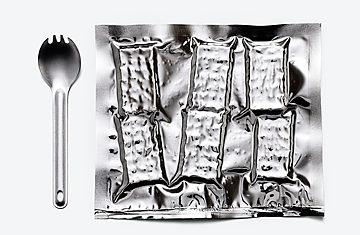
(2 of 3)
There are three big challenges to making food with a long life span, and a sandwich presents all of them: controlling moisture, controlling atmosphere and controlling microorganisms, from bacteria to mold. (Many traditional food-preservation techniques, such as drying and salting, work because they kill microorganisms or limit their growth.) Oleksyk's team members needed to keep liquids from the sandwich filling from seeping into the bread, so they mixed water-absorbing ingredients including glycerol and sorbitol into the filling. They also increased the use of fine, edible polymer films, which are undetectable in the mouth. (Hartel notes that in desserts, chocolate is often used as a moisture barrier. His favorite example is the Twix, designed so that chocolate separates the dry cookie from the moist peanut butter or caramel inside.)
The supersandwich also limits exposure to oxygen, which accelerates chemical changes in food, by tucking packets of oxygen-scavenging chemicals in the outer wrapping. And the packaging is as impervious as possible, with layers of heat-resistant polypropylene and metal foil.
But the most important advance may be innovative ways of controlling bacteria, like a newly refined method of high-pressure processing (HPP), which greatly improves taste. The old method of sterilization requires 30 minutes of 250F (121C) heat, and as any cook knows, every hot minute changes the food. With HPP, food is sealed in a plastic pouch, placed in a chamber and subjected to 87,000 lb. of pressure per sq. in., effectively killing any bacteria. The makers of some commercially available lunch meats, like Hormel's Natural Choice line, already rely on high-pressure processing rather than chemical preservatives. Companies that handle delicate seafood products like raw oysters are also adopting the approach. Oleksyk says the technique may soon allow the military to offer sandwiches stuffed with ingredients like tuna salad and mayonnaise.
"It's night and day compared to the old heating process," Oleksyk says. "The foods taste like they're freshly prepared." The Defense Department hopes to introduce packaged HPP fruit that will retain its crispness for at least three years in a way that cannot be achieved by canning. Oleksyk's goal is to eventually create meals that can last up to 10 years. That would mean--especially if combat rations continue to be delivered on the standard three-to-five-year schedule--that there would never be a point when the food didn't taste fresh, she says. "They wouldn't have any idea how old it actually was."
